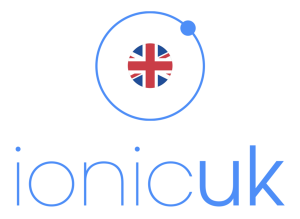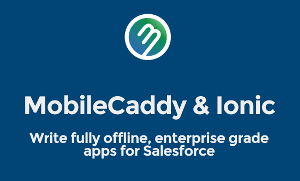As per our preview post, some of the MobileCaddy crew headed to the very first Ionic UK meetup… and boy what a fab evening it was. The event was organised by Sani Yusuf and Ryan Hanna and to say their efforts were clear to see would be an understatement.
The meetup took place at the excellent SkillsMatter, and they had everything that could have been asked for from a venue.

Sani Yusuf – Kick Off
An introduction to Ionic, it’s past, present and future was the starter dish for the evening. Sani took to the front in his famous Google Glass and took us through what life was like before tools like Ionic arrived on the scene. This was a time when to develop apps for mobiles meant using different languages for the different platforms. A time when these restrictions meant porting apps and having multiple, non-interchangeable teams of developers. He told us how the first wave of Hybrid apps promised to free us from these constraints and how these promises never really delivered… and then came Ionic.
Ionic, for those that don’t know, is a framework/SDK enabling folk to quickly build hybrid mobile apps using HTML5 technologies. Ionic uses the amazing Apache Cordova tools to take advantage of device features (GPS, camera, etc) as well as enabling the apps to be built into suitable formats for submission onto the different app stores (iTunes, Google Play, etc).
With Ionic came a toolset that removed some of the pains that developers were used to when initially building Cordova apps. A focus on performance meant that apps could now be built that had native like experiences… users shouldn’t/wouldn’t need to know if apps were native or hybrid. And this is what we really like about using Ionic ourselves at MobileCaddy. With every release (and keep in mind it’s still in Beta) the performance across all platforms just keeps getting better. Have I mentioned yet that we big fans of Ionic at MobileCaddy?
A quick demo was then rolled out to demonstrate just how quick it is to get started with Ionic… and if you want to see for yourself head over here. Sani joked at how you could have a $1bn app in minutes, in a way there are real serious opportunities available.

And just then not only did the beer and Pizza arrive, but we were also privileged to have Max Lynch (one of Ionic’s founders) join us on a Hangout.
Max Lynch – A Hangout
Max mainly focused on chatting about the new and upcoming features and tools that he and the Ionic folk were working on. Most of the focus was on the upcoming Ionic.IO. He discussed how that even though Ionic was currently enabling devs to build amazing hybrid apps that there were still pain-points and a lot more that could be done. Ionic.IO essentially delivers a platform to sit alongside the actual apps. This would deliver the following types of features;
- Push Notifications
- Dynamic Versioning – Being able to update your app without having to go through the app submission rigmarole.
- Analytics
- A/B Testing
At MobileCaddy we have already started addressing some of these issues using the Salesforce platform, for example we can already do Dynamic Versioning and have taken the idea even further with a greater level of control.
Max also talked about the recent work they have done with the Crosswalk project, and how this is further pushing increased performance on Android devices. Essentially this allows you to bundle a specific version of webkit with your APK (the binary application file that is installed on people’s devices). This has the effect of meaning, as a developer, you have a known landscape when dealing with your HTML/JS/CSS, as well as of course meaning you can take advantage of newer builds and their feature sets sooner that might otherwise have been possible.
One question came up for Max about Angular 2. His reaction was positive, saying he was excited and that Ionic for Angular 2 would be on the cards. He also mentioned that Angular 2 is pushing towards a component based framework. I’ve not really looked into Angular 2 in any great detail, but this component based framework might play very nicely with Salesforce’s Lightning components. We heard about these from Doug and Skip from Salesforce at the last London Salesforce Developer’s meetup, so see our review for more information.
Ryan Hanna – Showcase
Co-organiser Ryan was next up, with the task of showing off a few apps built with Ionic, but before I get to that I should cover some of Ryan’s background. He’s a self taught developer (using Code Academy) and has only been in the game for three or so years. What’s amazing then is the fact that he’s the sole developer on his own app Sworkit, and the success that this has had… but more about that later.
Zourist
Sworkit
Ryan then discussed his own app, a 4.5 star app available on both iTunes and Google Play. This is a real flagship app for Ionic, with over 3m downloads covering both OSs and is available in a Lite and Pro guise. The app is available in 13 languages, and this has been achieved using the Angular Translate module. Modules like this mean that tasks like making your app available for the international market reachable without too much effort, something that will be music to multinational organisations I’m sure.
With such a large user base I was keen to find out what Ryan’s experience had been with the accessibility of hybrid apps built with Ionic. He told me that the feedback he’d gotten so far had been very positive. My understanding is that basic HTML5 good practice pays off in the same way for apps as it does for websites.
Ryan had also mentioned something called localForage, this is a library that gives you a nice API for asynchronous storage (IndexedDB, WebSQL), resulting in an interface more akin to localStorage. We could certainly introduce something like this into our CodeFlow environment.
Todd Halfpenny – MobileCaddy
I was up next, and took the meetup attendees on a speedy tour of how MobileCaddy can enable JavaScript developers to build enterprise grade, robust mobile applications for Salesforce. I’ll hopefully post the slides up shortly, but the key takeaways were that MobileCaddy enables;
- JavaScript developers to build enterprise grade apps for Salesforce
- (Secure) Offline, Data Synchronisation out the box
- Salesforce authentication with no coding
- A controlled application development/deployment lifecycyle, including OTA app updates.
We also demonstrated our Deploy to Salesforce feature for the first time.

This allows developers to deploy new versions of their mobile applications to the Salesforce platform from within the very app they are building. I have to be honest and say that I am very excited about this, and even more so about where we see this heading. Just another tool that we hope will ease enterprise mobile application development.
Richard Sands – Angular Fullstack Ionic
A late entry to the lineup, Richard give us a whirlwind tour of his new Angular Fullstack Ionic project. I think he can explain it better than I can, so this is lifted from the Readme;
The motivation behind Angular Fullstack Ionic is to streamline the development of projects that include an API, Angular webapp and Ionic app. It’s core design principles include sharing code and assets wherever possible, creating an efficient workflow and making it super easy to start off a project with handy components available out of the box (e.g. user signup/login).
It is based on the brilliant Yeoman angular-fullstack project
His enthusiasm and passion shone through, and despite the project be very young I can see that it shows potential.
Closing Notes
The event was a great success, and I look forward to seeing more from this exciting community. And I’m sure that MobileCaddy will continue to be a part of it.
